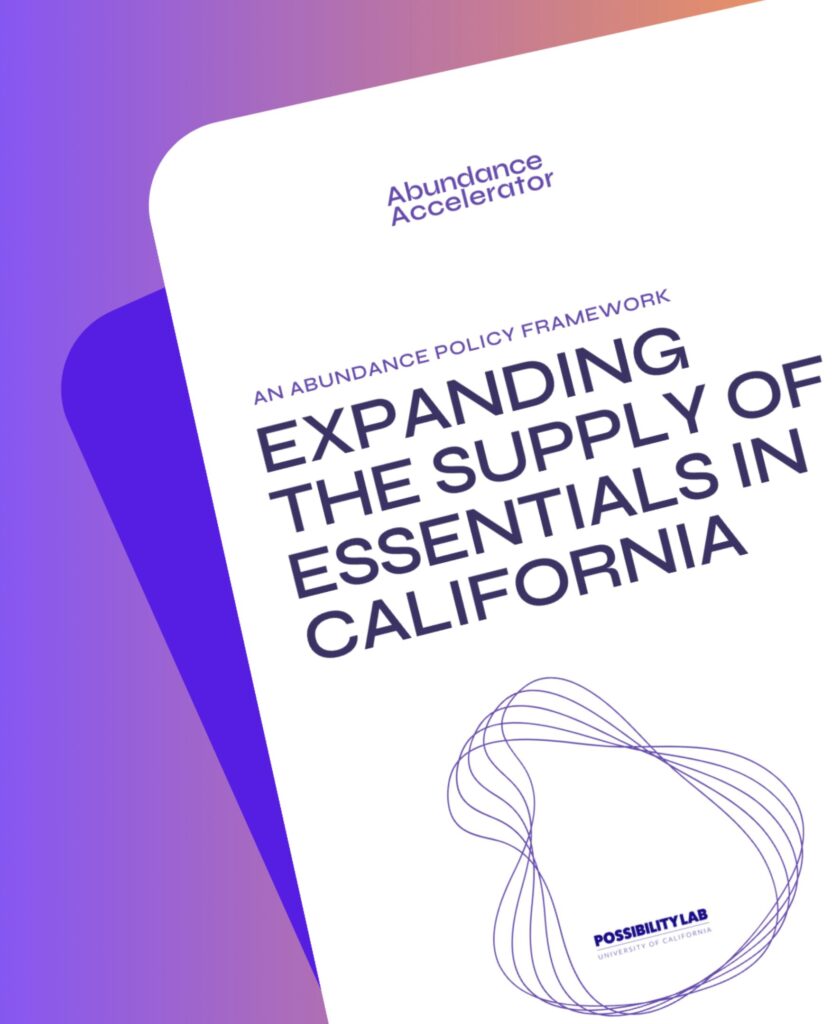Possibility Lab Launches Abundance Accelerator with Framework Report, New Website
On Wednesday, April 3, the Possibility Lab at the University of California announced the launch of the Abundance Accelerator, an ambitious initiative to expand California’s capacity to sustainably supply essential resources, goods, and services. While California is home to great economic abundance, far too many in the state still struggle with economic insecurity and a lack of access to basic goods and services, including shelter, food, and water. Together with a growing network of partners, the Abundance Accelerator will leverage research, innovation, and collaboration to advance policy solutions that promote abundance and help build an ecosystem that can design, pilot, and scale a “fundamentals-first” policy agenda.
“Many of the intractable issues we face in California today, including those related to climate change, housing, and energy, are currently framed in terms of scarcity, with policies addressing the best ways to allocate our limited resources. Scarcity, however, is not necessarily inherent to these issues, but is often a function of how our policies and politics fail to produce sufficient resources. By reimagining our systems and institutions, we can begin to mitigate this scarcity and move towards greater access for all,” said Possibility Lab Executive Director Professor Amy E. Lerman. “Our Abundance Accelerator aims to build new partnerships with government agencies and community organizations, and to employ data-driven strategies that help us build a stronger, more sustainable, and more equitable economy.”
To set the foundation for the work ahead, the Lab released an abundance policy framework report, Expanding the Supply of Essentials in California, and a website that lets audiences learn more about why working on abundance issues is so essential to California’s future. Potential research and project partners can also find out how they can join the Abundance Accelerator initiative.
As detailed in our foundational framework report, work on the Abundance Accelerator is grounded in the broad goals of expanding the supply of, and downstream access to, 12 human essentials: transportation, food, water, energy, safety, employment, healthcare, education, childcare, eldercare, and digital connectivity. The new initiative will work to develop an abundance policy agenda in California that addresses, among other concerns, what types of policy domains to prioritize, the role of political ideology, and the importance of incorporating equity and community voice into public decision-making processes. Policy reforms to promote supply-side growth will include ways governments can reduce barriers to entry, as well as make strategic public investments.
“Partnership is key to the success of the Abundance Accelerator and to creating a policy agenda in California that can sustainably resolve the issues at the heart of the crises we face as a state, and to build a future in which Californians no longer have to struggle to access essential resources,” said Possibility Lab Director of Projects and Planning Lindsay Maple. “We’re excited to work with partners from across the state to move discussions from the conceptual to the practical, and to ensure that the abundance agenda we develop for California is oriented around aiding those people and groups most marginalized in our current system.”
In February, the Lab released the Abundance Accelerator’s first two requests for proposals (RFPs). The resulting projects will support innovations in community engagement that facilitate fast and equitable production of housing and clean energy infrastructure. Community organizations, academics, and city, county, and state agencies are invited to apply in order to receive funding and technical assistance for piloting creative, tangible, and impactful solutions. Applications are being accepted on a rolling basis, with project announcements expected later this summer.
In addition to the already announced housing and energy RFPs, several additional Abundance Accelerator components will be coming through the rest of 2024 and into 2025.
- An RFP will be released this week, to develop a research consortium focused on the initiative’s 12 essential issue areas, kicking off with an informational webinar on Tuesday, April 16. More information on the webinar and how to register can be found on the new Abundance Accelerator website.
- In May, the Lab will release a report from our Abundance Accelerator partnership with the UC Berkeley Institute of Governmental Studies on key public opinion indicators connected to core essentials.
- In June, the Lab will release a report that analyzes the “tensions and trade-offs” that are key to understanding and guiding fundamentals-first policy work.
- Then, in early 2025, the Lab will convene its first Abundance Accelerator summit, bringing together thought leaders, policymakers, community organizations, and researchers to learn more about the Abundance Accelerator and help build the future of this multi-year initiative.

